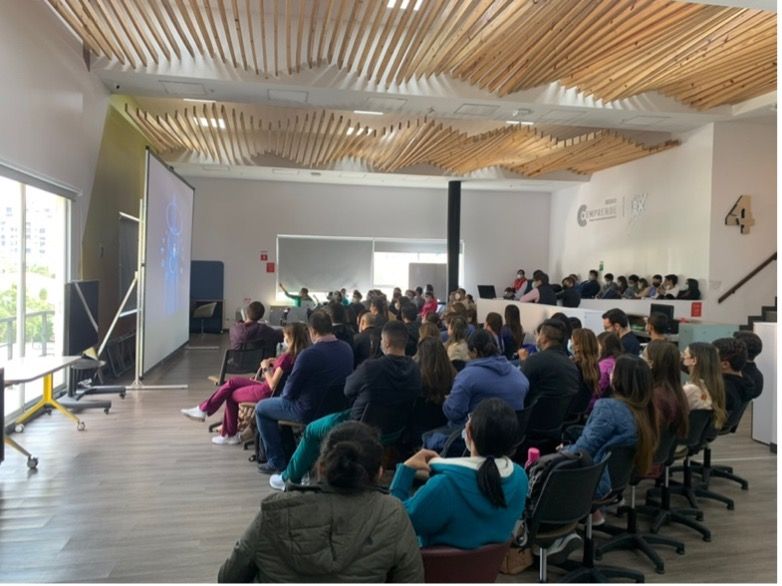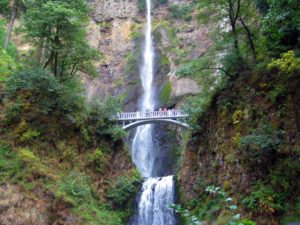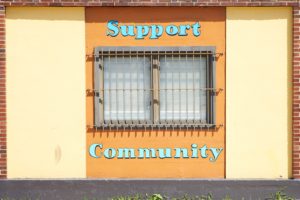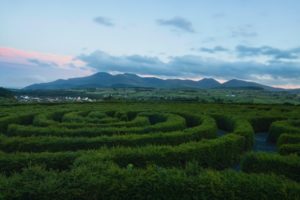It was 11:30p.m. on August 1st, and I arrived in Colombia as a Fulbright scholar. Amidst the COVID-19 pandemic, I had my K95 mask tightly secured on my face and, behind fogged-up glasses, I read the signs in Spanish directing me to immigration in customs. After years of anticipation, Fulbright had officially started.
The next day, I woke up early in my small, dark hotel room and went out to explore. Reminiscent of summer weather in Maine, the morning sun was strong, and the wind was cold: shorts and sweater were perfect while I walked to get a coffee. Sitting on a quiet street, I enjoyed listening to the birds sing and elderly couples chat on their morning stroll. Unaccustomed to the loud motors strapped onto the bicycles of the Rappi delivery boys, I was startled every time their bikes passed.
My contact at the local university had left for a sabbatical in Spain the same day that I arrived, so I was effectively alone in a foreign country with no points of contact. I began reaching out for help to get permission to enter the university. At last, a couple weeks after my arrival, a new point of contact met me at the university for orientation. It took a couple more months to find a rhythm. I was never settled, but I was finally building my routine.
The first weekend after meeting, my point of contact kindly invited me to go on a mini excursion to better get to know Bogotá. Excited to learn more about my new home, I eagerly accepted. To avoid traffic, she asked to pick me up at 7:00 a.m. We didn’t get back from our journey until 5:00 p.m.
The next weekend, my point of contact again invited me on an excursion. When I shared that I had plans on Saturday, she insisted that we go on Sunday instead.
At work, she invited me to guest lecture in her class. The students really enjoyed my presentation, and she said she would love to give me the opportunity to guest lecture every semester – perhaps even serve as a co-professor, officially starting the following semester.
I was developing a research portfolio focused on evaluating the impact of COVID-19 on the health, health behaviors, and well-being of university students, and she could not have been more supportive, connecting me with the dean, head of student health services, and other professors who were interested in the topic. I built a robust research team and received the necessary permissions to begin my projects.
And I wanted to rest on the weekend after after long weeks of work. I did not go on another excursion, but the price was a barrage of guilt-inspiring messages with attempts to confirm plans for subsequent weekends. This trend continued for months. On one hand, she was generous and kind – she went above and beyond to help orient me and take me to places I could not have seen without a car. On the other hand, I was mentally exhausted. I could not create the space I need for myself, and when I finally did, I was inundated with messages. It just felt easier to comply and spend time together than be overwhelmed with messages when I had physical space to myself.
One workday, I received a text message from other Fulbrighters asking if I wanted to go to Teatron over the weekend. Allegedly, Teatron is the biggest gay nightclub in Latin America. When I shared this information with my main contact – both asking what Teatron was and if she wanted to join – she immediately rejected the invitation, saying that the club is “for a certain type of person.”
It was now almost the holiday season, and everyone was hustling to finish projects, budgets, and research before the country (at least academia) shut down for a month. She, along with the program director and dean, formally offered me a job as a professor to stay on at the university after Fulbright ended. In addition to being my Fulbright supervisor at the university, she was now my point of contact for hire. We were working together twice a week at the university, weekly at a coffee shop in the suburbs near her home, and weekly at the Secretary of Health in Bogotá. In addition, she insisted that we go on weekend trips and that I celebrate the holidays with her family. One weekend, she took me to a village six hours outside of Bogotá and told me that she was too tired to drive back. Unaware at the outset of how far we were going, I insisted that I drive back, because I had other plans. A few weeks later, the same tactic was used, and I drove back in what was one of the worst thunderstorms I have ever experienced. When I spent a weekend with others, her disposition in the workplace changed. When I chose to spend Christmas on my own, I received more than 20 messages saying that I should come celebrate with her and her family.
Given that I had been introduced as a new professor at a recent faculty meeting, my contact set up a lunch – at a fancy restaurant – to help me network with a dean at a different school. Her strategic efforts paid off, and the dean invited me to teach medical residents, in addition to medical students and graduate public health students.
At this same meal, the dean graciously thanked us for inviting him. When the bill came, my contact placed it in front of me, thanking me for inviting everyone. Having just secured an additional source of income as a professor on the faculty of medicine, I felt trapped – do I make a big deal about the bill (which was over 10% of my monthly stipend from Fulbright), or do I just eat the cost, knowing that there will, very shortly, be future income that could cover the cost?
I was trapped in support and kindness – trapped and unable to break free of her orbit.
Trapped in a soundproof box, unable to hear my own thoughts.
Trapped in fear that, if I broke free, something would happen to my Fulbright grant, my university contract, or my grade in a class that I didn’t even know I was enrolled in.
Was I happy? I was certainly taking advantage of opportunities as they presented themselves.
Why could I not see the cost?
The new year brings a new perspective
My contact had invited me to join her family and a group of family friends to celebrate New Years at a Mexican restaurant in the very far suburbs of Bogotá. We arrived at 7:30 p.m., dinner was served at 11:45 p.m., and dessert was served at 1:45 a.m. At 2:15 a.m., as I was ordering my car service, she took my phone and told me not to be ridiculous. She insisted that she and her parents would drive me back to their house; they lived halfway between the restaurant and my apartment, so I could take a shorter, cheaper ride from their place. At 3:00 a.m., I found myself trying struggling to find a ride home – on hold with two different taxi services and trying to order a car on four applications. I was unsuccessful in procuring a ride. What she had not shared before making her offer is that she lived in the mountains, and no driver would go out to her house at that hour.
It was at 4:00 a.m. on January 1, 2022, that I gained clarity. I was visibly frustrated and upset. She asked me what was wrong. When I shared that I was tired and wanted to sleep, she told me that I could sleep there with her at her house. When I told her that I just wanted to shower in my home, she told me that her house was my house, and I could shower there. When I shared that I was stressed, she told me that the Colombian way of dealing with stress is to hug someone until all stress leaves the body.
Perhaps for the first time – at least in 2022 – I said no explicitly. I said no to her hug. I had, perhaps unknowingly, said no to her. Nonetheless, she came in for a very tight squeeze. As I was being physically crushed, it became clear to me that my identity and well-being had been crushed for months. This hug was not a hug – it was a symbol of the unwanted and continued sequestering of my autonomy.
This hug was not the discomfort of exploring a new culture. This hug was the uncomfort (yes, this is a new term) experienced when someone takes advantage of their position and disrespects you.
I created distance.
In the next months, I moved into a new apartment and began cooking healthier, working out with a trainer, and, perhaps most importantly, learning to be self-full. I began spending more time in the strong sun and refreshing wind in the shorts and sweater that I had worn on my first day in Colombia. I began hearing the birds sing again and cherishing the elderly couples on their morning strolls. I was now accustomed to the loud motors strapped onto the bicycles of the Rappi delivery boys.
During these next months, my university contract lingered, and I was ghosted. Months went by without being paid for classes that I taught – to date, I am still awaiting payment.
My grandpa always says nothing in life is free; there is always a cost. That cost can be paid with money, emotions, time, labor, sleepless nights, physical and mental health, and perhaps more often than not, a combination of methods. For months, I wasn’t happy. I was so focused on the opportunity that I never saw, or even considered, the cost.
Grandpa’s advice rings so true – nothing in life is free. You can’t have it all. Graduate school and, more broadly, life, is about learning how to identify the costs and making the tough decisions. What are your priorities, and what are you willing to pay? What will you endure, and what will you receive?
While I can put on my academic hat and focus on the research conferences, manuscripts, and guest lectures that were accomplished during my Fulbright grant, my greatest accomplishment came at the greatest cost. At the high cost of my well-being, I learned deep respect for myself and gained invaluable perspective that I did not have before. At the extraordinary cost of my identity, autonomy, and health, I learned one of life’s most important skills: to say “No.” While the catalyst for change happened overnight, literally, the change was gradual. We are all a work in progress, and sustainable change is not immediate. Sustainable change takes time.
Today, I woke up early in my bright apartment and went out to go and explore. Reminiscent of summer weather in Maine, I am focused on how to surround myself with people who can help me be the best and most authentic version of myself.
- A New Year, A New Needed Perspective - November 17, 2022
- Navigating the Line Between Discomfort and Uncomfort: Exploring Cultural Immersion - November 2, 2022
- Locating Eckhart Tolle’s “A New Earth” Within Current Public Health Epistemology: A Book Review - October 12, 2022




